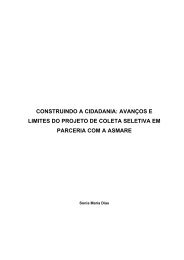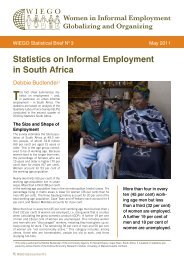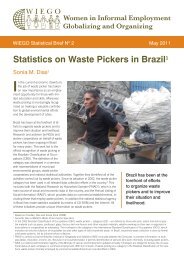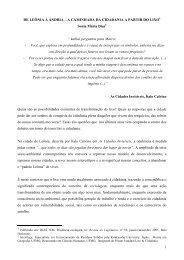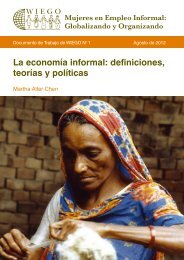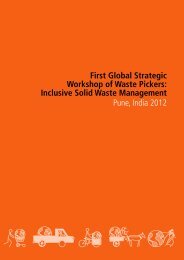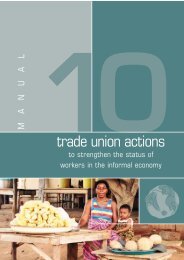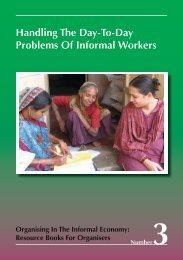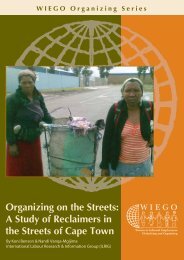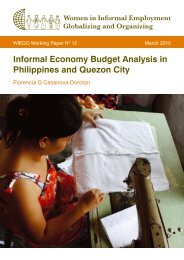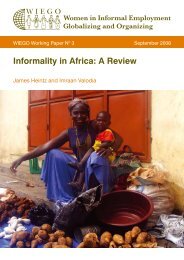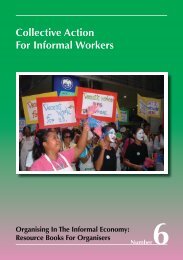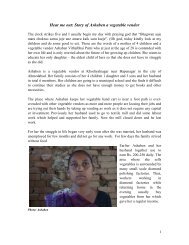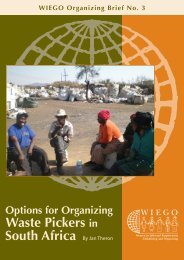Waste Pickers and Carbon Finance: Issues to Consider - WIEGO
Waste Pickers and Carbon Finance: Issues to Consider - WIEGO
Waste Pickers and Carbon Finance: Issues to Consider - WIEGO
- No tags were found...
Create successful ePaper yourself
Turn your PDF publications into a flip-book with our unique Google optimized e-Paper software.
Recommendations<strong>WIEGO</strong> Technical Brief (Urban Policies) N o 7A number of recommendations <strong>and</strong> implications for waste picker MBOs <strong>and</strong> their partners have arisenfrom this research. To summarize, in going forward in relation <strong>to</strong> carbon finance for waste picker organizations,stakeholders may want <strong>to</strong> consider the following:As noted in the “background document,” the Green Climate Fund (GCF) is not yet operational <strong>and</strong> doesnot yet have funding in place <strong>to</strong> support projects. Also, the mechanisms <strong>and</strong> guidelines that the GCF willuse <strong>to</strong> disburse funding <strong>to</strong> partners <strong>and</strong> projects in developing countries have not yet been developed.However, as noted by one waste picker ally:Direct, small grant funding <strong>to</strong> local governments, waste pickers’ cooperatives <strong>and</strong> similar subnationalentities has the potential <strong>to</strong> quickly launch programs which are innovative, grassroots-led,<strong>and</strong> tailored <strong>to</strong> local conditions. By funding local entities, the Green Climate Fund can sidestepcumbersome multilateral implementing agencies <strong>to</strong> deal more effectively with issues such aswaste management, which are h<strong>and</strong>led by local entities. Direct, local funding is an importantcomplement <strong>to</strong> national strategies, providing greater scope for experimentation (<strong>and</strong> valuable lessonslearned), local initiative <strong>and</strong> accountability <strong>to</strong> local populations.Tangri (2011: 4)It is therefore essential <strong>to</strong> stay engaged 11 with the process related <strong>to</strong> the development of the GCF’s fundingguidelines <strong>and</strong> mechanisms because, for one, the informal sec<strong>to</strong>r:...need(s) priority access <strong>to</strong> climate funds, both for adaptation <strong>and</strong> mitigation (recycling). Yet theyare frequently excluded from national strategies <strong>and</strong> sometimes in conflict with private sec<strong>to</strong>rprojects. One proposed solution is <strong>to</strong> allow the informal sec<strong>to</strong>r direct access <strong>to</strong> GCF, on par withthe private sec<strong>to</strong>r.Orenstein <strong>and</strong> Tangri (2012: 6)According <strong>to</strong> one key informant the GCF may not be capitalized until at least 2015, <strong>and</strong> according <strong>to</strong>another, organizations should not pin their funding strategies on the GCF because there is still uncertaintyaround how, <strong>and</strong> when, it will function. In keeping with this, a third interviewee suggested that thoseinterested in accessing climate change funding should focus on what is available now. There are plenty ofoptions. For example, national climate change funds may be a potential source of funding for waste pickerMBOs <strong>and</strong> should be looked in<strong>to</strong>.In line with this, it should be kept in mind that “the global climate finance architecture is complex” (Nakhooda,Caravani, Wenzel <strong>and</strong> Schalatek 2011: 1) <strong>and</strong> evolving. Therefore, resources must continue <strong>to</strong> bededicated <strong>to</strong> staying abreast of trends <strong>and</strong> <strong>to</strong> taking advantage of funding opportunities.<strong>Waste</strong> management is a local issue with global implications so it is critical <strong>to</strong> maintain links <strong>and</strong> <strong>to</strong> continue<strong>to</strong> share learning <strong>and</strong> build networks among the informal waste management sec<strong>to</strong>r around the world. Itis equally important <strong>to</strong> continue <strong>to</strong> advocate for the interests of waste pickers, given their vulnerability <strong>and</strong>their key role in addressing global climate change.Given the emphasis placed by one key informant <strong>and</strong> the potential sustainable benefits that it couldbring in terms of improved incomes without having <strong>to</strong> rely on others, further research should be conduct-11It should be noted that GAIA <strong>and</strong> the Global Alliance of <strong>Waste</strong> <strong>Pickers</strong> have already focused much advocacy effort <strong>to</strong>wards the GCF since its conceptionin 2009. The Alliance was represented by GAIA in most of the meetings of the GCF Transitional Committee in 2011 <strong>and</strong> of the GCF Board since itsestablishment in 2012. The key goals of the Alliance in tracking <strong>and</strong> influencing the work of the GCF have been <strong>to</strong> contribute <strong>to</strong> the design of a newclimate fund that is accessible <strong>and</strong> beneficial for waste pickers <strong>and</strong> <strong>to</strong> ensure that it will not undermine grassroots recycling <strong>and</strong> other “zero waste”strategies <strong>and</strong> initiatives.9



